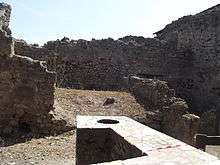Popina
The popina (plural: popinae) was an ancient Roman wine bar, where a limited menu of simple foods (olives, bread, stews) and selection of wines of varying quality were available. The popina was a place for plebeians of the lower classes of Roman society (slaves, freedmen, foreigners) to socialise and in Roman literature they were frequently associated with illegal and immoral behaviour.[1]

Features
Popinae were a type of wine bar generally frequented by the lower-classes and slaves, and were simply furnished with stools and tables. They provided food, drink, sex and gambling. Because they were associated with gambling and prostitution, the popinae were seen by respectable Romans as places of crime and violence. Although gambling with dice was illegal, it would appear from the large number of dice found at cities like Pompeii that most people ignored this law. Several wall paintings from Pompeian popinae show men throwing dice from a dice shaker (see MANN 111482 Photo: Museo Archeologico Nazionale di Napoli). Prostitutes frequented popinae, but as many of these wine bars found at Pompeii had no rooms provided with a bed, they must have met their customers at these bars then taken them elsewhere. The popina differs from the Roman caupona in that it did not provide overnight accommodation.[1]
Modern discovery
Physical remains of taverns and bars are found in well-preserved Roman cities.
120 popinae were identified in Pompeii, but many of them might have been misidentified.
Roman legislators could not actually do anything about what went on in taverns, but they could at least be seen to be trying.
The taverns are often identified by evidence of storage jars set into them. However, regular shops also contained those storage jars.
Some believed that the food and drink was sometimes catered when it was requested by a customer.
Etymology
The word is the Osco-Umbrian equivalent of Latin coquina, from Latin coquere "to cook".
References
- Potter 2008, p. 374.
Bibliography
- Potter, David S. (2008). A Companion to the Roman Empire. John Wiley & Sons. ISBN 978-1-4051-7826-6.
- William Stearns Davis, ed., Readings in Ancient History: Illustrative Extracts from the Sources, 2 Vols. (Boston: Allyn and Bacon, 1912–13), Vol. II: Rome and the West, pp. ??
- John DeFelice, Roman Hospitality: The Professional Women of Pompeii; Marco Polo Monographs,2001